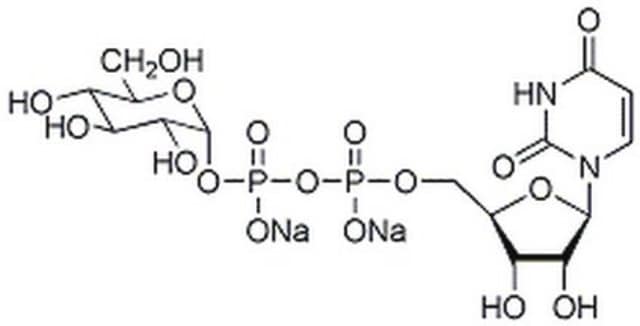G5131
Guanosine 5′-diphospho-D-mannose sodium salt from Saccharomyces cerevisiae
Type I, ≥97% (HPLC)
Sinónimos:
GDP-Man, GDP-mannose
About This Item
Productos recomendados
type
Type I
assay
≥97% (HPLC)
storage temp.
−20°C
SMILES string
[Na].NC1=NC(=O)c2ncn(C3OC(COP(O)(=O)OP(O)(=O)OC4OC(CO)C(O)C(O)C4O)C(O)C3O)c2N1
InChI
1S/C16H25N5O16P2.Na.H/c17-16-19-12-6(13(28)20-16)18-3-21(12)14-10(26)8(24)5(34-14)2-33-38(29,30)37-39(31,32)36-15-11(27)9(25)7(23)4(1-22)35-15;;/h3-5,7-11,14-15,22-27H,1-2H2,(H,29,30)(H,31,32)(H3,17,19,20,28);;
InChI key
MEXITZOHWLXZKR-UHFFFAOYSA-N
¿Está buscando productos similares? Visita Guía de comparación de productos
General description
Application
Biochem/physiol Actions
Storage Class
11 - Combustible Solids
wgk_germany
WGK 3
flash_point_f
Not applicable
flash_point_c
Not applicable
Certificados de análisis (COA)
Busque Certificados de análisis (COA) introduciendo el número de lote del producto. Los números de lote se encuentran en la etiqueta del producto después de las palabras «Lot» o «Batch»
¿Ya tiene este producto?
Encuentre la documentación para los productos que ha comprado recientemente en la Biblioteca de documentos.
Los clientes también vieron
Artículos
Explore tools for glycosyltransferase synthesis and modification of glycans, such as glycosyltransferases and nucleotide sugar donors.
Explore tools for glycosyltransferase synthesis and modification of glycans, such as glycosyltransferases and nucleotide sugar donors.
LC-MS/MS method quantifies similar polar nucleotide activated sugars using Supel™ Carbon LC column for simultaneous analysis.
LC-MS/MS method quantifies similar polar nucleotide activated sugars using Supel™ Carbon LC column for simultaneous analysis.
Nuestro equipo de científicos tiene experiencia en todas las áreas de investigación: Ciencias de la vida, Ciencia de los materiales, Síntesis química, Cromatografía, Analítica y muchas otras.
Póngase en contacto con el Servicio técnico








